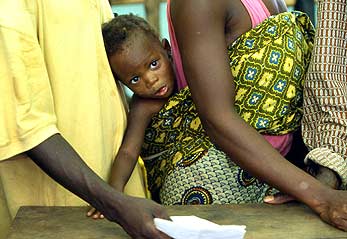Thousands of refugees caught in renewed fighting in eastern Liberia
Thousands of refugees caught in renewed fighting in eastern Liberia

MONROVIA, Liberia, March 27 (UNHCR) - A UNHCR transit camp has come under fire amid resurgent rebel fighting in eastern Liberia, raising concerns about the fate of thousands of Ivorian refugees and other nationals. Meanwhile, the agency has relocated its staff from all border locations, deemed unsafe at the moment.
On Wednesday, rebel forces attacked Zwedru, in Grand Geddeh county, eastern Liberia, near the border with Côte d'Ivoire. Since then, UNHCR has lost touch with some 5,000 Ivorian refugees and other West Africans at the Zwedru transit centre. There are fears they may have been caught in the attack.
"We have been in contact briefly with our two local staff who had remained behind this afternoon. They managed to flee to the south of Zwedru," said Theo Vodounou, UNHCR's emergency co-ordinator for border operations, in Monrovia on Thursday. "However, we have no information on the whereabouts of the refugees."
The fighting erupted as UNHCR was making plans to move all refugees from Zwedru to another transit centre in Harper, on the Atlantic coast, because of growing insecurity in Grand Geddeh county.
This is the second attack on the area in less than a month. On February 28, rebels reportedly coming in from Côte d'Ivoire attacked Toe Town, some 80 km north of Zwedru. Three humanitarian workers of the Adventist Relief and Development Agency (ADRA) were killed and thousands of people were forced to flee, including the 2,500 people hosted at UNHCR's Toe Town transit centre.
Following fresh hostilities in Toe Town, UNHCR on Wednesday relocated most of its Liberian staff from its four border locations to Monrovia.
Liberia's eastern regions were relatively spared from war until a few months ago, when people fleeing the conflict in western Côte d'Ivoire started flooding in. Since then, the Ivorian crisis has trickled over to neighbouring Liberia. The unstable situation in Liberia has severely hampered UNHCR's ability to assist some 100,000 persons - Ivorian refugees as well as Liberians and other West Africans previously living in Côte d'Ivoire - who have fled into Liberia since November.
Besides the refugees, UNHCR is also very concerned about the safety of humanitarian workers in the region. Just weeks after the Toe Town killings, four staff of the International Committee of the Red Cross (ICRC) were killed on the other side of the border, in western Côte d'Ivoire.
To help people affected by the Ivorian crisis, the UN refugee agency has appealed for a total of $29 million in funds. More than 120,000 people have been affected by the six-month conflict, which remains largely unpredictable despite progress on the political front.
In Liberia, UNHCR's two other offices near the border with Côte d'Ivoire - Saclepea in Nimba county, and Harper in Mariland county - were reported to be calm on Thursday.
Meanwhile, in a separate development, rebels on Tuesday attacked a camp for internally displaced persons at Ricks Institute, some 20 km outside Monrovia. The attack left several people dead, with thousands of displaced persons abducted by the rebels, according to government reports.
Amid news that the rebels had advanced as close as 10 km to Monrovia on Tuesday, UNHCR staff were instructed to remain at home, but resumed work at the office on Wednesday.
By Thursday, Monrovia residents had apparently resumed their lives. "Life goes on as usual," said UNHCR's Vodounou. "Children are going to school, and the shops are open, but we are constantly watching the situation."








